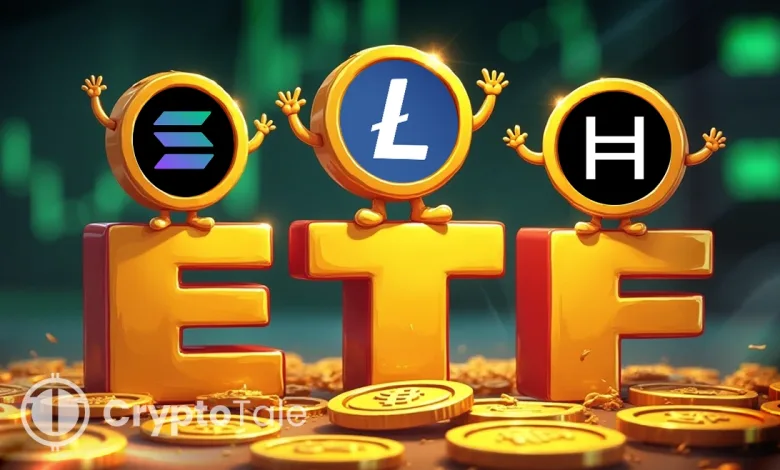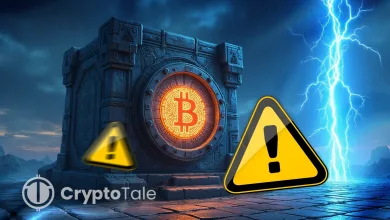Canary, Bitwise, and Grayscale Roll Out New Altcoin ETFs Despite SEC Halt

- SOL, LTC, and HBAR ETFs set to begin trading while the U.S. shutdown halts normal reviews.
- New SEC rules now let altcoin ETFs gain approval automatically without delay.
- The launches mark a shift toward regulated altcoin exposure in institutional markets.
The rollout of the cryptocurrency ETF is gaining momentum despite the U.S. government shutdown. Canary Capital, Bitwise Asset Management, and Grayscale Investments are moving forward with their altcoin ETFs, bypassing administrative disruptions. Their approvals rely on automatic effectiveness clauses embedded in amended S-1 filings and certified Form 8-A registrations that permit listings without direct SEC intervention.
Canary Capital’s spot Litecoin (LTC) and Hedera (HBAR) ETFs will debut on Nasdaq, while Bitwise’s Solana (SOL) ETF and Grayscale’s GSOL trust conversion are set for NYSE launch today. The filings have been confirmed through certified exchange notices. According to Canary CEO Steven McClurg, “Litecoin and Hedera are the next two token ETFs to go live after Ethereum. We look forward to launching tomorrow.”
This structural development reflects a legal evolution: prior groundwork by regulators has enabled issuers to proceed autonomously. The SEC’s earlier establishment of standardized listing criteria under Nasdaq, NYSE Arca, and Cboe BZX allows crypto asset managers to move ahead once key conditions are met.
Canary, Bitwise, and Grayscale Lead the Next ETF Phase
Fox Business reporter Eleanor Terrett confirmed that the NYSE certified all 8-A filings and posted listing notices for Bitwise’s SOL ETF and Grayscale’s GSOL conversion. Bloomberg’s Eric Balchunas corroborated the reports, noting that these certifications represent the final step before trading begins.
The 8-A filing registers ETF shares under the Securities Exchange Act of 1934, while the S-1 covers their issuance under the Securities Act of 1933. Together, they form the legal foundation for listing on an exchange. In most cases, the SEC must manually announce the effectiveness of an S-1, but in this instance, the issuers revised their filings to start the automatic effectiveness 20 days after submission. This provision operates without any staff involvement, allowing launches to occur despite the shutdown.
The new generic listing that the SEC developed allowed asset managers to obtain expedited permission if their filings conformed to the standard criteria. This change in the process eliminated waiting time while still maintaining regulatory supervision through the standards of the pre-approved exchange.
Regulatory Groundwork Enables Structural Shift
The isolation of these launches from regulatory influences is a clear demonstration of how regulatory policy changes are altering the crypto ETF landscape. By completing most of the compliance and technical prerequisites in advance, issuers are operating under a “set-and-go” model. Automatic clauses ensure continuity even when government agencies are understaffed or inactive.
Canary’s filings show that both ETFs, tickered LTCC and HBR, carry an annual sponsor fee of 0.95 percent. The infrastructure supporting them, including custodians and authorized participants, was prepared well in advance of the shutdown. Simultaneously, Bitwise and Grayscale finalized exchange notifications for their SOL products to begin trading on consecutive days.
Related: U.S. Government Shutdown Freezes SEC Crypto ETF Approvals
Why Is This Important?
The approval of the ETFs during a period when the government was not in session indicates the maturity of the crypto-financial framework. Litecoin, Hedera, and Solana are now being added alongside Bitcoin and Ethereum inside regulated ETF wrappers. Their presence enables new channels of exposure to be opened for institutional portfolios seeking diversification within compliant structures, allowing them to invest in these new assets.
Nevertheless, some operational risks remain associated with this. The stoppage of the administrative process may affect subsequent filings, audits, or disclosures, even though the current launches are proceeding smoothly. However, the market is gradually gaining the conviction that crypto ETFs have entered a self-sustaining phase of their evolution, as exchanges announce new listings and issuers continue to meet legal compliance requirements.




